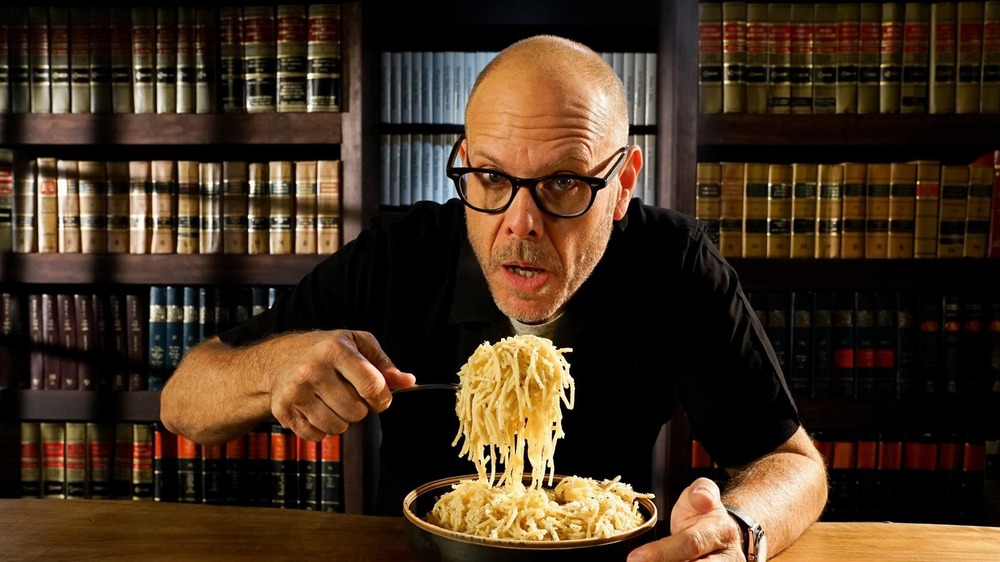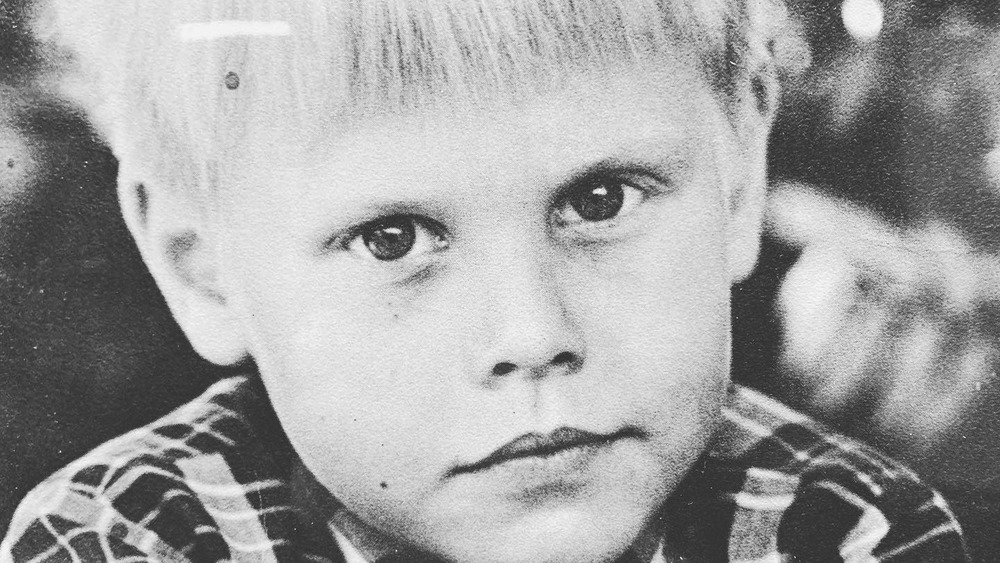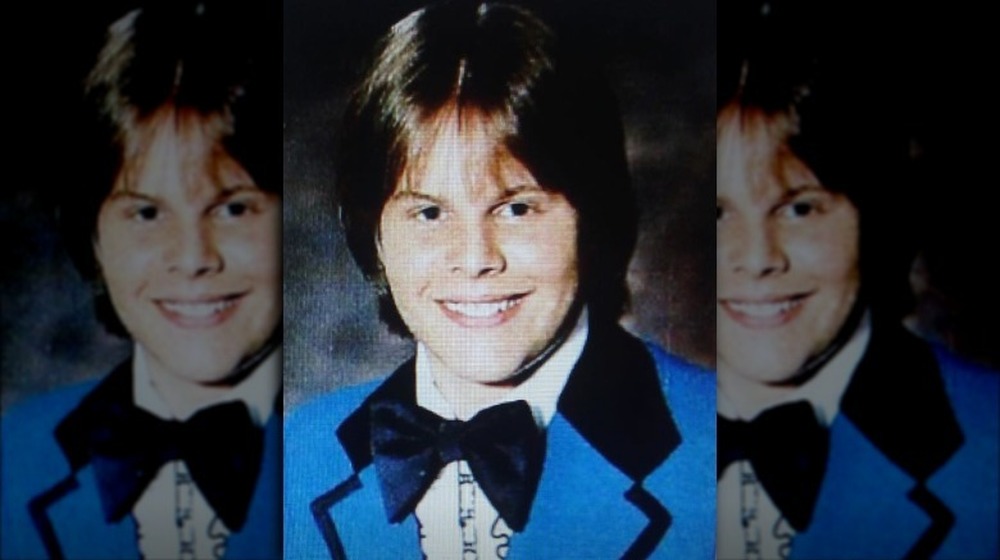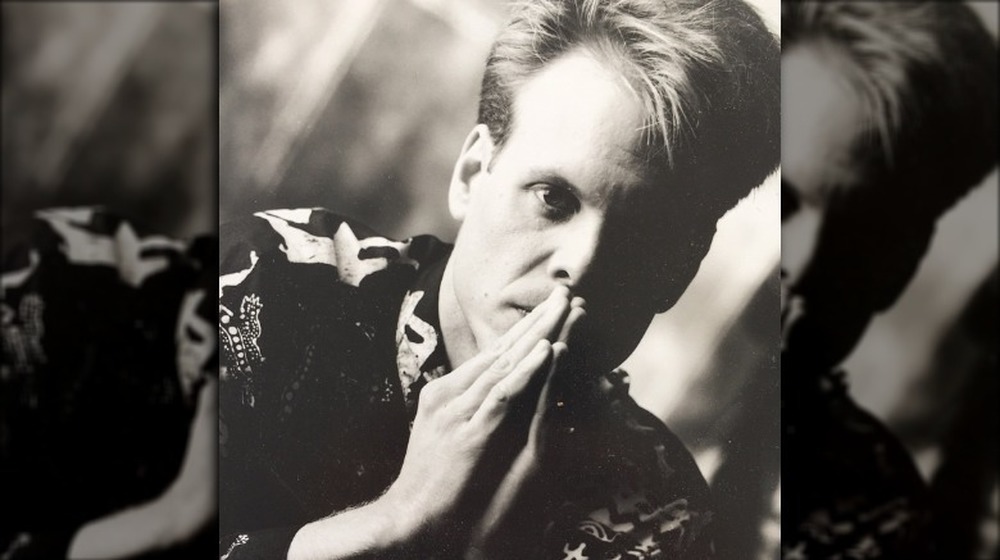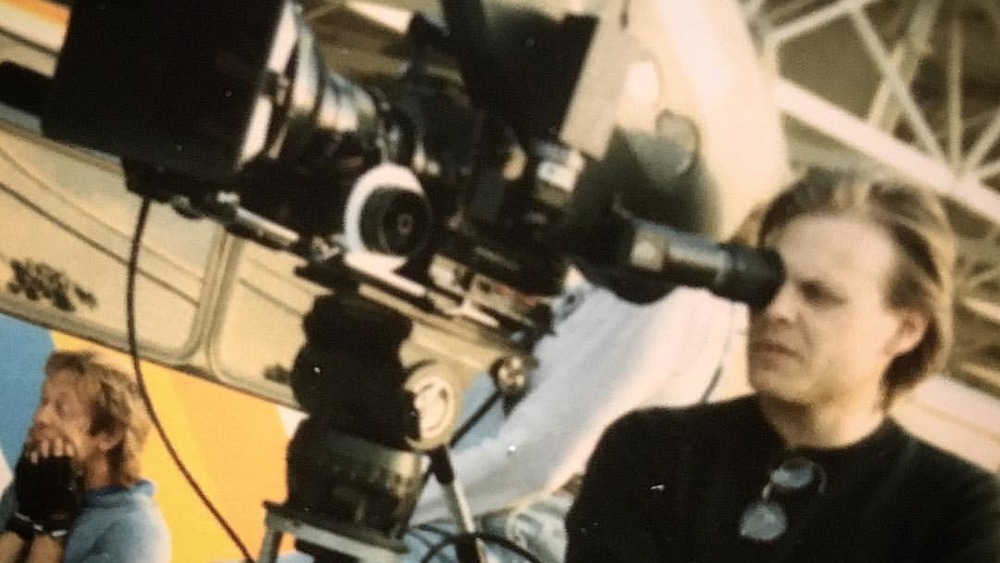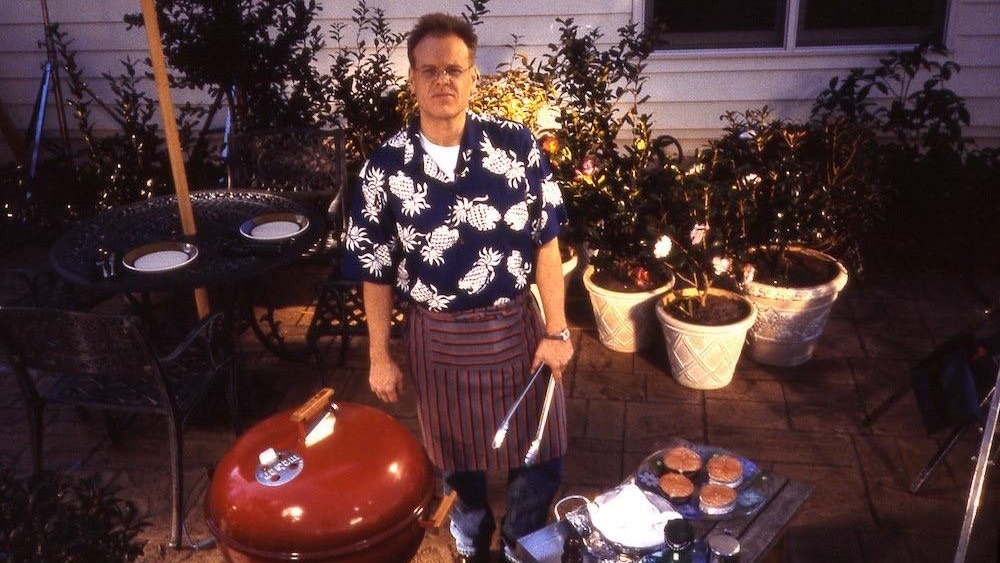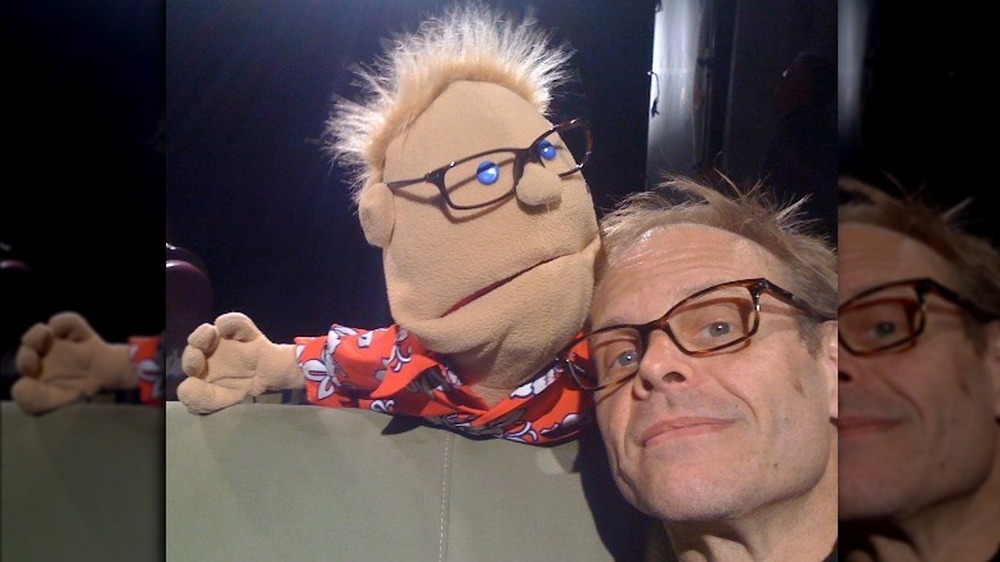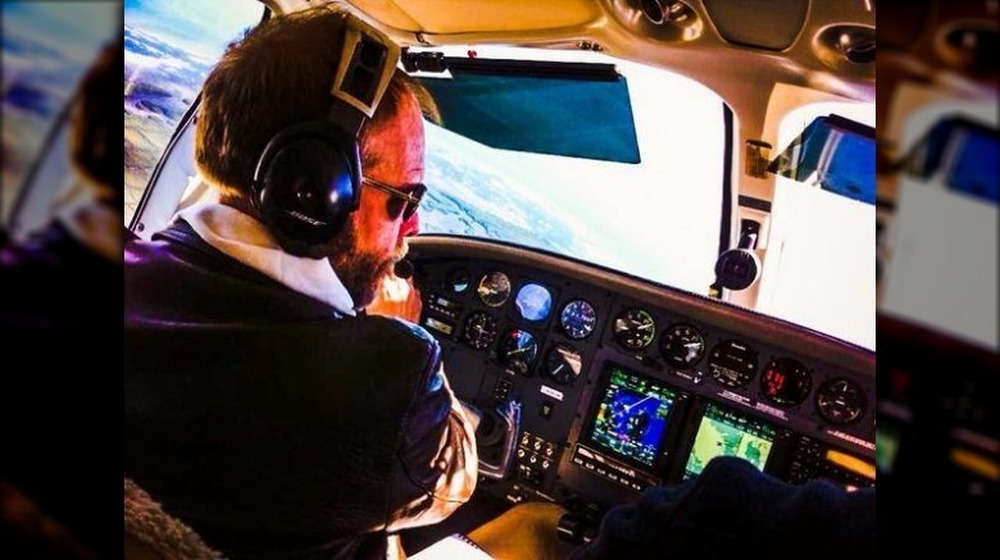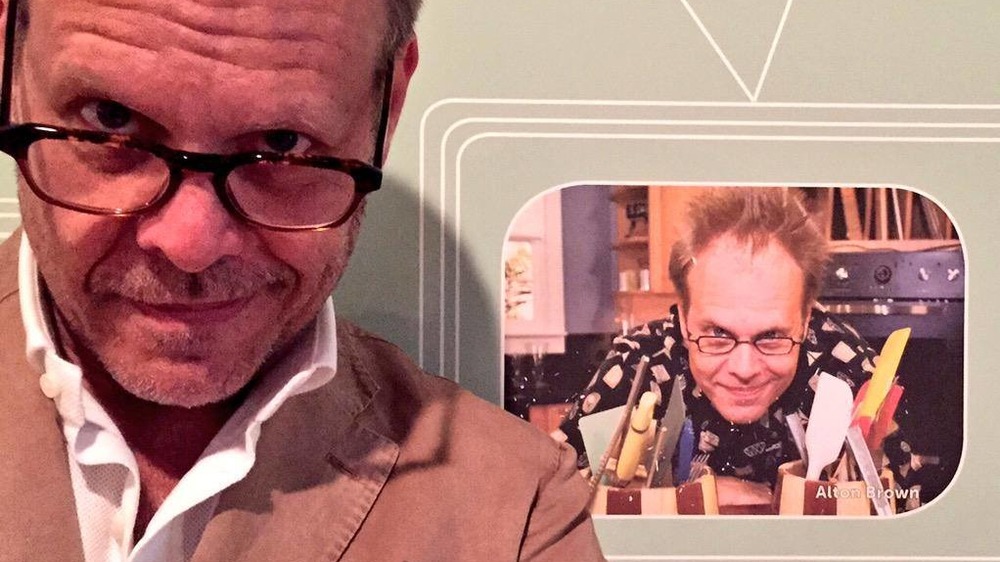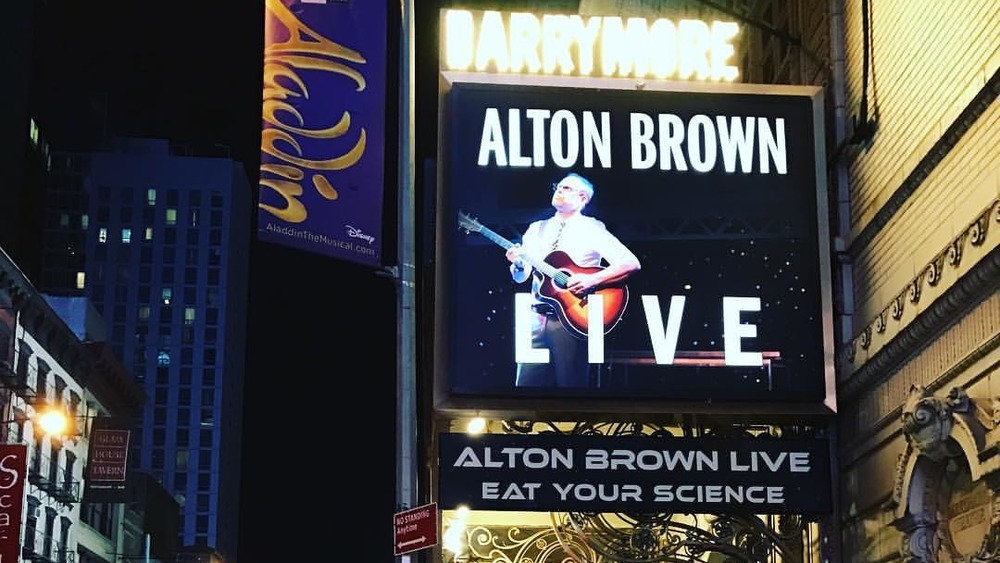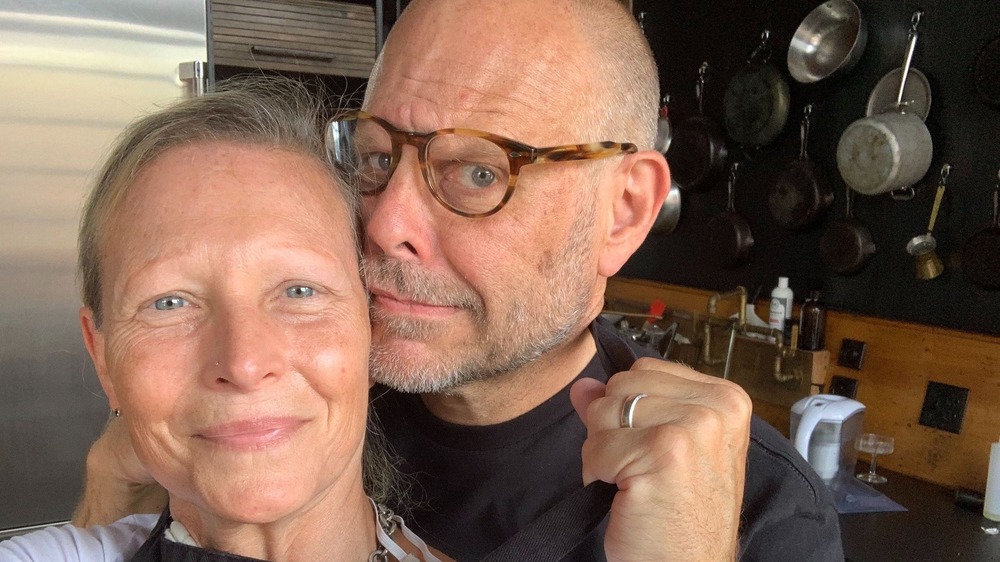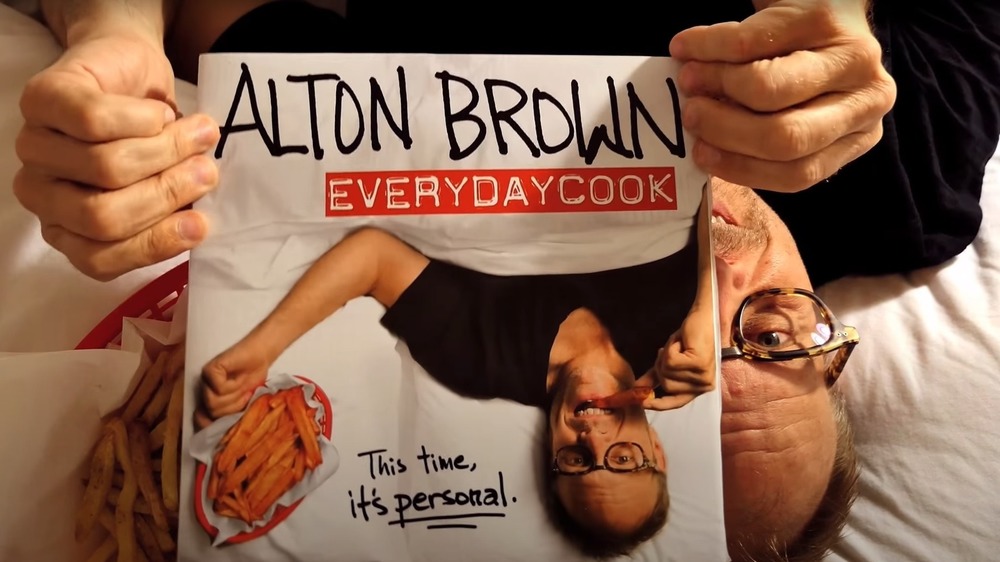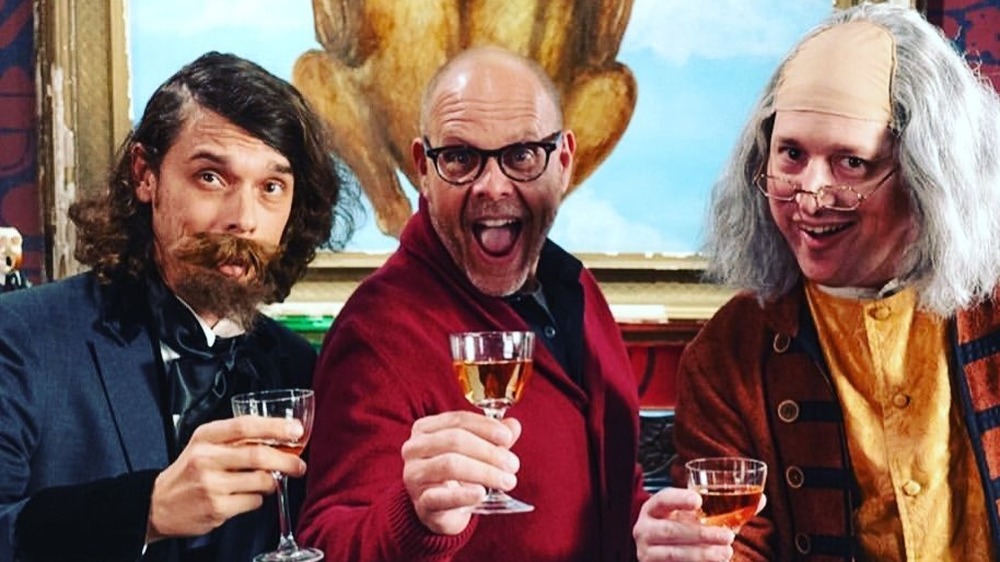Alton Brown's Transformation Is Seriously Turning Heads
With Good Eats, Alton Brown redefined the look and feel of food shows. He brought in pop-culture, science, history, and a ton of humor. Unlike other food shows at that time, Brown "never fetishized the food", he said in an interview with the Television Academy Foundation. "There is no such thing as a beautiful green bean casserole [...] It's green bean casserole, we all know what it looks like." Instead, Brown believes that, if the process is perfect, the result would take care of itself.
Ever since Brown first debuted on the Food Network, much has changed. For starters, he lost oodles of weight with his self-made diet plan. As People reports, he also went through a rough patch in his personal life and re-explored his views on religion. But wherever he strayed to, food remained his anchor. "Food is actually one of the last universal things [humans share]. We don't have it in politics. We don't have it in religion. We don't have it in culture," he said in an interview with Bitter Southerner.
In fact, that sort of transformation has been part of his life since Brown was very young. Here's how Alton Brown's transformation over the years has been seriously turning heads.
Alton Brown moved across the nation when he was only 7
Alton Brown was born to Alton Sr. and Phyllis Brown in Los Angeles on July 30, 1962. While Brown slowly learned his first words and took his first steps in a house surrounded by apricot and lemon trees in North Hollywood, around him the society changed at a lightning speed (via The Wall Street Journal). California in the 1960s was all about music-loving hippies and suntanned surfers. Brown's parents, both Georgia natives, had liked what the city had to offer, so much so that what was supposed to have been their brief honeymoon there was extended to 14 years.
Brown's dad always wanted to own a radio station, and when an opportunity presented itself to own one in Cleveland, Georgia, the family packed their bags and moved to a town that had little in common with the dreamy West Coast vibe. It was tough on little Brown. "I was 7, and Georgia came as a shock. Some of the kids didn't wear shoes to school, and I got beat up a lot because I couldn't keep my mouth shut," he told The Wall Street Journal.
Alton Brown had a tough time fitting in at school
Being the new kid on the block wasn't easy for Brown. "I never made the transition and never fit in," he told The Wall Street Journal. He found solace in music, however. "Because my dad owned a radio station, he'd bring home promotional copies of albums. When he gave me the Beatles' "Sgt. Pepper," I didn't leave my room for six months," he said. Brown, who had learned how to play the piano when he was just five, also took up the saxophone at the age of 10. "The sax got me through a lot," he said.
Things did not get much better in high school. In an interview with Bitter Southerner, he compared his school to an "internment camp". He said, "I was saved by the fact that I got very into jazz music, and there was a jazz band there, so I kind of lived in that world." If anyone should get the credit for Brown being the Brown as we know him today, it should probably be musicians like Miles Davis, he said (via Atlanta Journal-Constitution).
As he progressed from high school to university, music followed. He learned how to play guitar there and frequented live music shows while still a student.
Alton Brown lost his dad while he was still a kid
Alton Brown was only 10 when his father died. While the death came as a shock to Brown and his mother, what left them unsettled was the way in which he died. "One day, they found him at his desk with a plastic bag taped around his head. They never figured out if it was suicide or murder, but my dad was hardly the suicidal type," he told The Wall Street Journal. For years, Brown carried the burden of believing that his dad had been murdered, though police concluded that he had died by suicide (via The New York Times).
Once they moved on from the initial shock of the incident, a young Brown and his mother had to think about survival. Brown's mother was employed as the editor of the newspaper that his dad had owned. But, as Brown candidly put it to The Wall Street Journal, "She came from a time when women didn't matter much if they weren't married. She didn't waste much time before remarrying." Brown would go on to have four stepfathers and a bunch of step-siblings.
After graduating from high school, Alton Brown studied filmmaking
While most kids graduate from high school at the age of 18, Brown was out two years earlier. That was "not a good thing," he told Bitter Southerner. "I was way too young, so I wasted a couple of years." He wanted to pursue his passion of music, but his stepdad at that time argued that it was a dead-end venture and instead pushed Brown to study business. (via Television Academy Foundation)
But Brown knew he was not cut out for it. He instead steered towards an entirely new field: theatre. It so happened that the college he went to study business at had a state-of-the-art theatre complex. "So my first day at college, I decided to go and try out for a play. And I tried out for a play, and I got a part in a play, and after that, I never turned back. So I ended up with a theatre degree," he told the Television Academy Foundation.
Theatre organically led to an interest in filmmaking, which came with its own challenges, as his college lacked a film program. Brown, seeking more film experiences, eventually transferred to the University of Georgia.
Alton Brown found food shows boring, so he made one himself
Brown was as part of a lighting crew for a video shoot, straight out of the University of Georgia, though he never graduated, being one foreign language credit short of his degree (via Television Academy Foundation). His stint as a camera operator for R.E.M.'s The One I Love 1986 music video proved to be a turning point. "Without that, my career wouldn't have happened. Or if it had, it would have taken a very different form," he said. After the REM project, opportunities poured in.
Around this time, Brown got into watching food shows, but they sorely disappointed him. "I remember I was watching food shows, and I was like, "God, these are boring. I'm not really learning anything," he told Bitter Southerner. Meanwhile, he had also realized that he loved cooking. What had started as a ploy to get girls to go out with him in college had turned into a serious hobby.
This soon got Brown thinking of making his own show. "That is the seed that got planted that became Good Eats eventually," he told the Television Academy Foundation.
Good Eats was Alton Brown's first real claim to fame
Alton Brown frequently spoke about the idea of a food show that mixed science and entertainment to his then-wife DeAnn. While the whole world thought that "he had gone off the freaking rails" for thinking there would be a market for such a food show, DeAnn had faith in his nascent idea. Upon her insistence — and with her financial support — Brown joined the New England Culinary Institute in Vermont (via Television Academy Foundation).
After graduating, he presented the scripts for two pilots to a company that made commercials. They agreed to produce it on the condition that Brown host, while someone else directed. This was a major plan change for Brown, who was of the idea that he would direct and have someone else host. He accepted the conditions, though, and got working in the fall of 1997. When the episodes were out, it didn't create the stir that Brown expected. "Nothing happened for a long time," he said.
Then, a big break arrived. A programming executive at Food Network chanced upon snippets of Good Eats that had been uploaded online, and, in less than four months, Brown was working on the first episode of Good Eats. He had no clue that he would be making 248 more (via The New York Times).
Good Eats landed him a hosting job on Iron Chef
Two years after Good Eats premiered in 1999, says Bitter Southerner, Brown got an offer to host Iron Chef America. Brown was very familiar with the concept of the show, as he had watched the original Japanese Iron Chef when it was broadcast on a San Francisco television station (via ABC News).
For, Brown, who sometimes took a whole day to get one shot for Good Eats, Iron Chef was a whole new experience. He was shooting two episodes a day. But just as with Good Eats, Iron Chef had him roll up his sleeves and meticulously study the ingredients that the chefs brought with them in the show. He even made PowerPoint presentations of all the ingredients that every chef used. "The goal for me was never to be surprised by an ingredient. Ever," he said (via Television Academy Foundation). It must have worked, as Brown continued to host Iron Chef America for a further 11 years (via The Roanoke Times).
Alton Brown learned how to fly
It was necessity that drove Brown to take up flying. In 2002, Brown was to go on a multi-city tour to promote his first book I'm Just Here for the Food. Air travel had changed significantly in the wake of the September 11 attacks, PBS reports, leading to intensified security at airports. "What I survived from the TSA convinced me that I should just learn how to fly planes and to skip them altogether, which is what I did," he told the Television Academy Foundation. Brown got his pilot license in 2008 and has owned two small planes since then.
Flying has proved to be convenient for Brown who, in a 2013 interview with Sherman Travel, said he spent 480 hours in flight every year. Though Brown has been clear that he is not in it for the sake of hobby or freedom, he does thoroughly enjoy the experience of flying. "Americans tend to travel either by car or by airliner, neither of which gives you a real idea of what America — the land — looks like. [Speaking as a pilot], everyone should have an opportunity to see this place from about 5,000 feet off the ground. It's a stunningly different perspective," he said.
In 2012, Alton Brown quit Good Eats because he got bored
In Brown's opinion, Good Eats served its purpose in expanding the scope of a food show after its original 15 seasons. "It broke a mould," he told the Television Academy Foundation. "We never fussed over the plating. I never concerned myself with selling the food, I was there for selling the idea of the food," he said.
But at the end of the show's 13th year, he called it quits. "Quite frankly, as a filmmaker, I was getting bored. So I wanted to wait for technological changes," he told Fast Company. "I wanted to see how the food landscape changed. I wanted to see how the media landscape changed." As soon as he quit Good Eats, Brown busied himself with a ton of other projects including a podcast, and playing mentor in the Food Network Star series, which, he said was "the hardest work I have ever done in television, by far".
Alton Brown went on to host Cutthroat Kitchen
Yet another reason Brown quit making Good Eats was that he felt a new wave of food shows was sweeping through Food Network — a wave that would probably annihilate old shows such as his own. "I said, 'I'm not gonna get canceled. I quit!'" he told Time.
Brown jumped on the bandwagon and began hosting a culinary game show called Cutthroat Kitchen. The idea for the show, which centered on sabotage and bizarre challenges for the contestants as they tried to make it to the final round, came from Brown's stint with The Next Iron Chef. After doing 200 episodes over a span of four years, Brown hit a saturation level with hosting game shows. He conveyed this to his followers on Facebook, saying, "I've had enough guys. I need to get back to what I do." Later, he confirmed the end of the series on Twitter.
Alton Brown made his way into Broadway
In the afterglow of the success of Good Eats, Brown came up with a live show based on the series, including sock puppets, history, humor, and fast-paced dialogue reminiscent of a Good Eats episode. The live tour gave him an opportunity to go back to playing guitar, which was something that he hadn't done in a long time. "That part of my personality has been in hibernation for 30 years, so all of a sudden, being able to do that is a real kick," Brown told The Roanoke Times soon after he had kick-started his first live music tour in 2013. He'd previously done other non-music live shows, though some of those appearances were deeply controversial.
The response was great, with 144 shows in 120 cities. Bitten by the live tour bug, Brown created another variety show called Eat Your Science in 2016. That fall, Brown got an opportunity to perform on Broadway. For Brown, who had quit business studies to pursue theatre in college, performing on Broadway was his answer to those who had said, "a theater degree is the stupidest thing, you're never going to amount to anything" (via Fast Company).
Alton Brown ended his 21-year-old marriage in 2015
Alton Brown's first wife DeAnn was instrumental in getting Brown to where he is today. DeAnn, whom Brown knew from his days creating TV commercials was the one who put him through culinary school, pushed him to write scripts for Good Eats, and even came up with the name for the series (via Television Academy Foundation).
Despite pulling through several challenges together, the couple divorced in 2015. "We changed, the world changed, and she went one way and I went the other way. I think we're probably both a heck of a lot better off where we are," Brown told People.
After the divorce, Brown gained 20 pounds, as he told The New York Times, blaming excessive drinking and peanut M&M's. But he soon picked himself up, lost the extra weight, and even got a designer to renovate his industrial loft where he moved to after leaving DeAnn. Elizabeth Ingram, the interior designer, and Brown hit it off and were engaged a year after the renovation finished. "Now, I like me better," he told People.
Alton Brown gave a glimpse of his personal life in his eighth book
Alton Brown's days after Good Eats included a bevy of experiences that pulled him far away from his identity as a cook. Hosting a game show and strumming the guitar in front a packed audience felt good while it lasted, but soon led to a bit of an identity crisis. "I think I was starting to feel kind of lost," he told Fast Company. "So, I thought, well, what I need to do is look at the food that I actually cook on a day-to-day basis," he said. This led to his eighth book, EveryDayCook.
The book is simply a peek into Brown's way of cooking — with no fictional characters, no puppets, and no mind-boggling camera angles. Instead, Brown presented his most authentic self. "EveryDayCook is just me personally sharing my food and it's a statement of who I am," he said. EveryDayCook includes recipes that Brown makes and eats on a regular basis and a list of his favorite pantry items and kitchen tools (via The New York Times).
Now Alton Brown is back where it all began
Alton Brown could only stay away from Good Eats for so long. Though he quit working on it in 2012 with no plans of making a sequel, he found himself right back in the mix seven years later. In 2019, Brown's Good Eats: The Return premiered on Food Network. And it's the best work of his career, he said in an interview with Eater.
For the new show, Brown has been able to use better production tools. Over the years, there has also been an increase in awareness about and ease of access to ingredients, which broadened the scope of food concepts that he dissected for his audience. "We're doing a show on ancient grains, and a few years ago people were like, "What the hell are these?" he told Eater.
Besides television, Brown wanted to create a web-exclusive series as far back as 2016. While that dream never quite manifested, he did produce a series of casual cooking videos with his wife while the pair were in lockdown due to the 2020 COVID-19 pandemic. "So for the first time," he told Salon, "I'm in a combo. I'm in a group setting, which I'm not used to, but it's a lot of fun."
